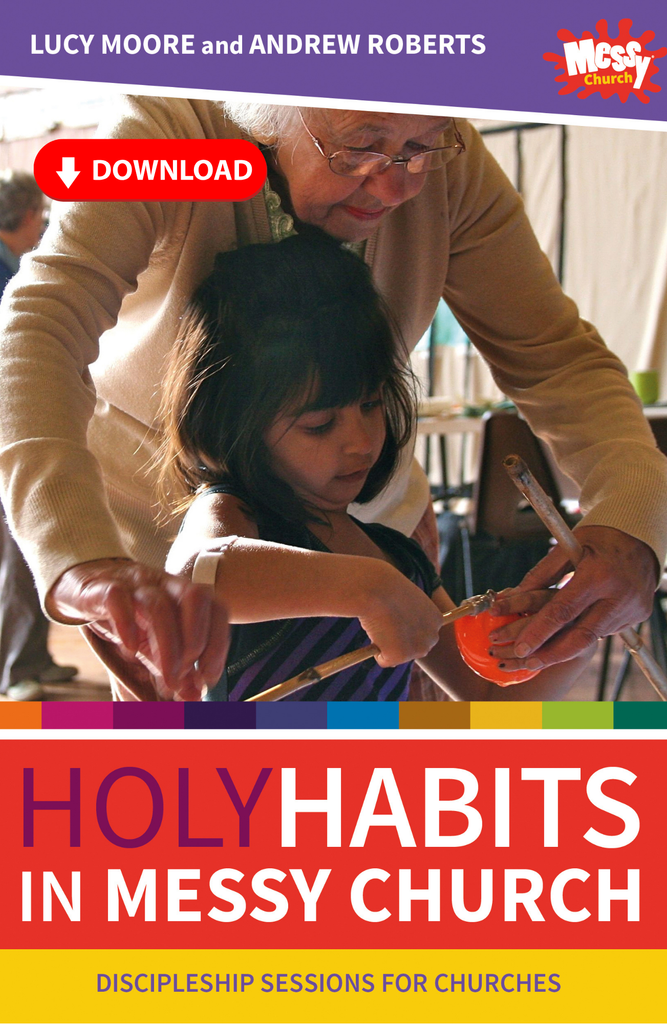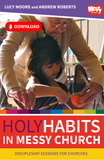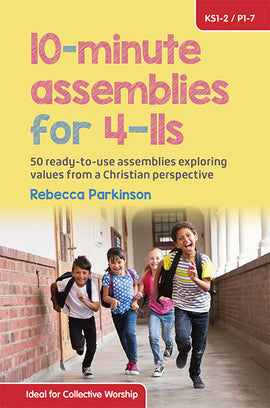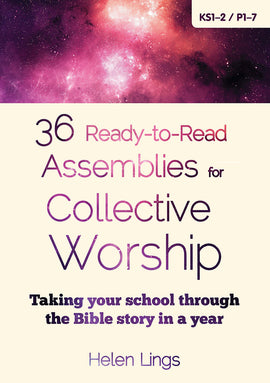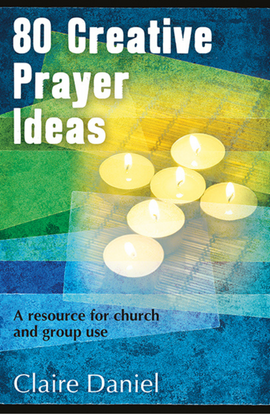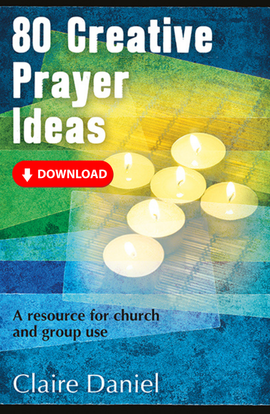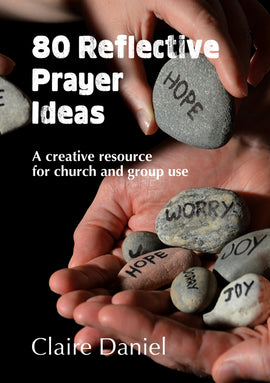Holy Habits in Messy Church: Discipleship sessions for churches
Messy Church sessions exploring the holy habits from Acts 2:42–47
Digital eBook Only - Holy Habits meets Messy Church! The Holy Habits approach explores Luke’s model of church found in Acts 2:42–47, identifies ten habits and encourages the development of a way of life formed by them. This session material has been created to help churches explore the Holy Habits in a Messy Church context and live them out in whole-life, missional discipleship.
This item is available to purchase from BRF Ministries with orders being fulfilled by Glassboxx, our digital service provider.
Additional support material - available at messychurch.org.uk
| Title | Holy Habits in Messy Church: Discipleship sessions for churches |
| Authors | Lucy Moore Andrew Roberts |
| Description | Digital eBook Only - Holy Habits meets Messy Church! The Holy Habits approach explores Luke’s model of church found in Acts 2:42–47, identifies ten habits and encourages the development of a way of life formed by them. This session material has been created to help churches explore the Holy Habits in a Messy Church context and live them out in whole-life, missional discipleship.
|
| Details |
|
Digital eBook Only - Holy Habits meets Messy Church! The Holy Habits approach explores Luke’s model of church found in Acts 2:42–47, identifies ten habits and encourages the development of a way of life formed by them. This session material has been created to help churches explore the Holy Habits in a Messy Church context and live them out in whole-life, missional discipleship.
Lucy Moore is the founder of Messy Church. She promotes Messy Church nationally and internationally through training and speaking events, and is the author of a number of books for BRF.
Andrew Roberts is a husband, father, minister, writer and speaker. He is the author of the book Holy Habits (Malcolm Down Publishing, 2016) and editor of the BRF Holy Habits original resource booklets, Bible Reflections and Group Studies. He was previously Director of Training for Fresh Expressions.
Church Times 04.12.20. Review by Catherine Pickford
(See also: What's in the Bible (for me)?; Holy Habits Bible Reflections: Serving: 40 readings and reflections and Holy Habits Group Studies Serving: Leader’s guide)
All four of these books seek, in different ways, to help their readers to weave “holy habits”, such as generosity, servanthood, worship, and discipleship, deeper into their daily lives.
What’s in the Bible (For Me)? explores the theme of journey in 50 short sections. Each has a Bible reading, a reflection, a question, and a challenge or thought. The deceptively simple format covers a great deal of ground, from the reader’s personal faith journey with God to the social-justice themes of homelessness, the plight of asylum seekers, and the Church’s mission to the poorest in our society. In this little book, Moore connects Bible passages with issues in our modern world and asks what it means to be on a journey with Jesus and how this changes the way Christians live.
Holy Habits in Messy Church is my favourite type of Messy Church book, one with plenty of practical sessions. As part of the introduction, one co-author, Andrew Roberts, offers the analogy of Lego: the maker ‘might follow the booklet once, but then they throw it away and create all sorts of wonderful things.' One of the great strengths of Messy Church is its creators’ commitment to giving it away, and letting churches make it their own. Holy Habits in Messy Church encourages exactly that. There are 11 sessions around holy habit themes, including gladness and generosity, serving, and worship, with a short Bible reading and a story, and then a selection of craft ideas to mix and match.
The last quarter of the book is dedicated to ‘messy vintage’, which is Messy Church for older people. Each of the 11 sessions contains a Bible reading, a single activity, some questions for discussion, a prayer, and a song suggestion. They resemble a hybrid between a Bible study and a prayer station and could be easily adapted for mixed groups of adults and children, or incorporated into a larger act of worship.
Service is prominent in the national consciousness at present, as we celebrate and thank God for key workers, whose acts of service are necessary to our survival. These last two titles reflect on the nature of service as a holy habit, and how a willingness to serve may become embedded in the Christian’s daily life.
Holy Habits Bible Reflections: Serving is one of a series of ten books designed to be used daily over an eight-week period by an individual or group. It offers a two-page spread per day, with a Bible reading, reflection, and prayer. The format is simple and effective, and the four authors complement one another with clear voices and different styles.
Holy Habits Group Studies: Serving is Bible-study material designed to support churches in offering service through mission, discipleship, and social action. The four authors move deftly from the theoretical to the practical, and encourage the group to wrestle with the question of how faith affects the way we live.
As a parish priest, I would want to think carefully about how to use this book. The group is likely to come up with action points that are suggestions for the whole church. They will need a way of presenting their ideas to the church, perhaps through a slot in the PCC meeting. Another idea would be to use part of this study material at the PCC meeting itself to generate an action plan for the whole church.
Taken together, these four books challenge their readers, in different ways, to mould their lives to be more like that of Jesus by adopting holy habits so as to be of service to others as individuals and as a church.
Reviewed by the Ven. Catherine Pickford, Archdeacon of Northolt, London.
URC Children and Youth Work Team’s bi-monthly e-update March 2020
Holy Habits in Messy Church is a collaborative work by Lucy Moore (Messy Church) and Andrew Roberts (Holy Habits) which quite neatly does as it says on the tin. Taking each of the Holy Habits in turn, there are suggestions for Messy Church teams, for specific sessions, for Vintage Messy Church. Some of the suggestions have a hint of the crazy but all are good and formative in exploring everyday discipleship. Is your Messy Church walking the Way?
The Irish Methodist Newsletter, Jun/July 2020. Review by Revd Stephen Skuce
In recent years, ‘Messy Church’ (www.messychurch.org.uk) has had a very significant impact in a wide range of churches in enabling creative, imaginative all age worship that uses craft ideas to help communicate the Christian message. Lucy Moore has produced a wide range of resources that equip people to lead sessions and fully explains the ‘how to’ bits alongside the more theological ‘why’ aspects.
In the last couple of years, a British Methodist minister, Andrew Roberts, has developed a series of resources titled ‘Holy Habits’ (www.holyhabits.org.uk). These are based on Luke 2:42-47 and help us recognise the practices or habits of the early church, and live them out today. The ‘Holy Habits’ movement has spread far beyond Methodism and is increasingly recognised as a straightforward and clear way to help us live our lives as followers of Jesus.
And as the title of this book sort of states, the two movements have combined here to give a ‘Holy Habits’ focus to ‘Messy Church’. It’s excellent. It combines the best of both to give us sessions covering Jesus, gladness, evangelism, sharing, serving, the Bible, eating together, worship, prayer, breaking bread and fellowship. Each session is fully detailed and is easy enough to use to help us explain to ourselves and others what it means to live out our faith. We rightly focus on evangelism, especially with children and young people. Sometimes though we can neglect to help new Christians develop solid habits that support faith development and show to others how our faith impacts our lives.
Don’t assume this book is only for work with children. It’s not. ‘Messy Church’s attraction lies partly in the way we are all ages together’ (p9). It is very much all age and while it’s an excellent approach for younger ones, it is especially helpful for families as an initial experience of Christian life and worship. The days of us communicating effectively through passively sitting in pews listening to a monologue are sort of gone. We rarely do that in other aspects of life, and this book is an easy to use resource that helps us put on sessions that can work for the whole worship service. The ideas and sessions will work particularly well with smaller congregations and numbers. And there is an excellent ‘Messy Vintage’ section to the book that is designed to work with a much older age group and is very usable in services in care homes and in other settings with older people.
This is one of those books that you can pick up and use. All is explained thoroughly and it isn’t gimmicky. The sessions communicate clear and comprehensive Christian understanding to build us up in our faith. It will be great to see such imaginative approaches increasingly used in our worship and outreach.
Reviewed by Revd Dr Stephen Skuce, District Superintendent, the North Western Methodist District

